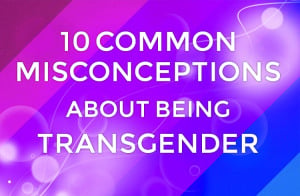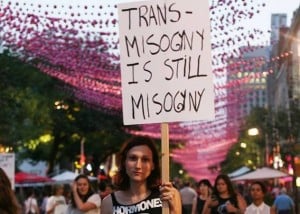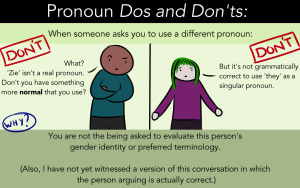Dear Mom,
I used to look back on my childhood and wonder why you made the choices you did while raising me.
I would tell myself that if it were up to me, things would be different. I wouldn’t be a victim. I wouldn’t be a stereotype. I would be the boss of my life, and my choices would be made according to what I wanted, not what everyone expected of me.
What I didn’t realize until now is that as a Latina single mother, some of those choices had already been made for you by the society you lived in.
But while you accepted and complied with society’s perception of what it meant to be a Latina single mom, you inadvertently taught me that if I wanted to be successful in life, I would have to be everything that society said you were not.
I internalized all of the negative things I learned about what it meant to be you. And this self-hate made me push back against my cultural identity and renounce the possibility of motherhood.
I write to you now because I want you to understand the myths I learned from you about what it means to be a Latina single mom and why they were harmful.
More importantly though, I need you to know that you are so much more than what any of these myths say you are.
1. Being a Latina Single Mom Means You’re a Financial Burden on Society
Growing up, my mom depended on government assistance to provide for us. I was born when my mom was only fifteen years old, and she stopped going to school to raise me. She wanted to give me a better life than she had, so we moved to the States from Puerto Rico when I was eight years old. When we arrived, neither of us understood much English.
It took me two years to learn how to speak English while I was in school. It was harder for my mom since she was older and was not exposed to the language as much. This meant it was a struggle to find jobs. When she was able to find jobs, mostly in the service industry, she could only work the hours my siblings and I were in school. Only being able to rely on one income, it was impossible to afford childcare.
I didn’t understand how my mom’s identity as a Latina single mother created a barrier between her and financial stability, so I assumed she just wasn’t working hard enough to get unstuck – after all, that’s what all of the messages around me suggested.
We depended on food stamps to feed us and thrift store vouchers to put clothes on our backs. There were times we were homeless and had to depend on shelters for a roof over our heads. Christmas-time meant gifts donated to us by families we would never meet.
Later, during my college years, I told myself I would starve before applying for government assistance.
And I did – for a while at least. The social stigma of Latina single mothers receiving welfare was so present in my mind that I started really believing that my family and I were a financial burden on society, charity cases, moochers who were always asking for more and never contributing much in return.
Mom, I remember the times you would wake up early in the morning and ride your bike to work. Even though you couldn’t afford a car and the rides were often cold, you never missed a day. Then there were the long trips from the pantry and the heavy bags you carried on the bus to make sure we had enough to eat. I couldn’t see it then, but I see it now. I know now that you never took anything without giving much more in return.
2. Being a Latina Single Mom Means the Role of Motherhood Becomes Your Only Role
I come from a long line of Latina single mothers. My grandmother had eleven children who she struggled to raise on her own while relying on her older children for help. Although she had many jobs over the years, her most important role was that of mother.
Although my mom is a gifted singer, dancer, and artist, she has never seriously pursued any of these interests. She didn’t go back to school after I was born, even though she has always expressed desire to do so.
I remember thinking it was unfair to be so gifted when you only planned on being a mom.
Motherhood seems to be a defining role in the life of Latina women. It’s so ingrained in our culture that most of us have imagined our own happy families before we’re even old enough to have children. We’re taught how to cook and clean properly at an early age and are often responsible for younger siblings while Mom is away at work.
Because of the cultural significance placed on motherhood in the Latina community, many Latina women end up having children before finishing their education. Many of these women are also then faced with the burden of raising those children on their own.
Because I rarely saw my mom focusing her time on anything she was truly passionate about, I assumed if I became a single mom, I would have to give up everything else, too. So I spent years telling myself I didn’t want children.
Mom, I remember the precision with which you decorated every home we lived in. Every household project was an art project to you. You were an interior decorator.
And then there were the stories you would tell us that would entertain us on the most boring days. You were an entertainer.
When my sister and I would fight about who was more beautiful, you would tell us that we had different kinds of beauty. My sister, with her porcelain skin, was Cinderella. But, I was always your Esmeralda. You were a mediator.
I know now that you were never just a mother.
3. Being a Latina Single Mom Means Depriving Your Children of a Stable Family Unit
My father died when I was three years old, so you could argue that my mother wasn’t a single mother by choice. However, this wasn’t what the public saw when they judged her for raising her children without a father. When we would misbehave, even my mom would complain it was because there was no man in the house to whip us into shape.
In the Latin culture, there is nothing quite like a strong father figure when it comes to raising respectable children. This is something even the most authoritative Latina mother apparently cannot fulfill.
This means that a Latina single mother is responsible for all of her children’s downfalls, which can be attributed to growing up without a father.
This ideology had a significant impact in my mother’s life because she always felt the need to fill that void. When she found herself in relationships with abusive partners, it was as if she thought it was more important for her children to have an abusive father figure than not to have one at all.
Mom, you were always stronger when you were on your own. I have never seen anyone pick themselves up so fast after a relationship ended. You were never abusive because you knew you didn’t have to be. In fact, we were a more stable family and endured less abuse when we didn’t have a father figure in our lives.
I know now that having grown up without a father didn’t affect my stability or my ability to accomplish my goals.
4. Being a Latina Single Mom Means You’re Sexually Irresponsible
As the oldest of four siblings, I was once an only child. I can admit I wasn’t thrilled when I realized I would have to share my mom with someone else, let alone three other people.
As I got older, my feelings towards the growing number of siblings went from slight annoyance to bitter contempt for my mother’s irresponsible actions. I couldn’t understand why she would choose to have another baby when it was already hard enough to take care of the ones she had.
Much later, I realized this did not always happen completely on purpose. Even though she loves all of us very much, not all of us were exactly planned. Because of our cultural family values, not keeping a baby was never an option, regardless of financial circumstances.
This wasn’t because she was irresponsible, but rather because she didn’t have the resources or education to prevent pregnancy. In our culture, motherhood is very prominent, but ways to prevent motherhood are not often discussed.
The media shaped my thoughts about the sexuality of Latina single mothers as much as my own mother did. Latina single mothers are presented as promiscuous and always in search for a sexual partner who would also provide for her children.
In reality, Latina single mothers don’t necessarily have more sex or more sexual partners than other single mothers – or anyone, period. They do, however, receive less education and fewer resources than others. And this is an extremely harmful structural problem.
Mom, sometimes in life, you have to learn lessons the hard way. I learned that when I became pregnant at 19 years old.
Whether it was the lack of sex education or just poor decision making on my part, you never judged me for it.
I never thought it would happen to me, but I learned then that it doesn’t matter the number of partners you have or how often you have sex, you can still get pregnant – whether you’re Latina or not!
5. Being a Latina Single Mom Means You’re Self-sacrificing and Submissive
When my mother was a little girl, she experienced sexual abuse and domestic abuse from the people she was taught to trust the most. When she told my grandmother, my grandmother chose not to believe her, and so it went unreported.
After she had her children, my mom was still very much living a life of abuse from the men in her life. She seemed too scared to do anything about it, and these terrible people enacted violence against her for years.
I believe she thought she was doing this for us. She wanted us to have everything we wanted, even if it meant she would have to suffer. It was as if she didn’t see herself as deserving of any rights.
Although there is the stereotype of the loud and aggressive Latina, things become a bit confusing when it comes to being a Latina single mother. All of a sudden, you become someone living to fulfill the needs and desires of innocent lives. You’re expected to do anything to protect them – and oftentimes, you do.
In other words, you renounce your personal identity when you have children – or so I was made to believe.
Children of Latina single mothers know their mothers are strong and independent women, but they’re viewed differently as a minority group by outsiders who don’t understand the culture.
As a minority group, Latina single mothers are the docile servants of society. They are the people most willing to do the work others will not, if it means their children will be provided for. They are the people most willing to endure abuse. They’re the most willing to submit to the roles assigned to them because they are no longer individuals, but self-sacrificing beings.
Mom, remember my sixteenth birthday? It was the day our abuser was sentenced to fifteen years in prison for all the horrible things he did to our family.
I remember when you testified and the way you pointed at him when they asked you if he was in the room that day. You looked straight at him with no fear. It wasn’t a look of submission or self-sacrifice; it was a look of pure anger.
I know now that no matter how long it takes, you won’t let anyone get away with hurting the people you love.
***
So Mom, I can imagine the painful memories my words bring of your struggles against cultural and societal norms.
However, these myths are not the only things I learned from you. Even when the world told me I should focus on being everything you were not, I know now I am lucky for the parts of you I did manage to salvage.
I am resilient, I am independent, and I am hard-working.
These are the qualities that I gained from observing you. This is what society often fails to acknowledge of Latina single mothers, but they are nevertheless the contributions that continue to grow and strengthen the leaders of the future. And for that, you deserve to be proud.
[do_widget id=’text-101′]
Katherine Garcia is a recent college graduate with a BA in Radio, TV, Film and soon to be graduate school student pursuing a Masters in Women and Gender Studies. She is passionate about LGBTQIA+ rights, domestic violence advocacy, Latinx issues, and mental health awareness, as well as 80s hair metal, used book stores, astrology, and chocolate. You can follow her on Twitter @TheLazyVegan1.
Search our 3000+ articles!
Read our articles about:
Our online racial justice training
Used by hundreds of universities, non-profits, and businesses.
Click to learn more





















